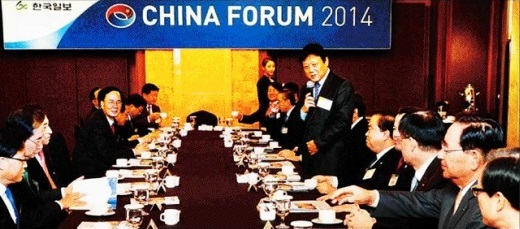
At the 2014 China Forum’s session held in Seoul on November 7 under the theme of ‘The Potential and Future Prospects of Direct Renminbi-Won Trading’, the speakers agreed that direct trading in the renminbi will be a crucial in assisting both countries’ economic growth.
Prof. Liu Jing, CKGSB Associate Dean and Professor of Finance, emphasized the importance of the internationalization of the yuan for the following reasons; first, the internationalization of a currency that represents the nation’s status is essential for China to prosper as a global economic power. Secondly, it can cut a company’s costs from raising funds and exchange risks. Lastly, it is vital for China’s as it gradually changes to a capitalist economic structure. However, Prof. Liu said, “Considering the reality that the U.S. Dollar index is 53 while the Yuan index is still 1.7, the full internationalization of the yuan is still a long way from happening.” He also said it remains a long-term and political process.
Huang De, a senior executive at Bank of China’s Seoul Branch, explained that direct won-yuan trading is an important factor in achieving the internalization of the yuan. Currently, eight different currencies including the dollar, yen, pound, Australian dollar and New Zealand dollar are traded directly, but considering the growing trading volume between Korea and China, it is essential that direct won-yuan trading is promoted. Tae-Hyung Ha, the President and CEO of the Hyundai Research Institute, highlighted the opportunities for Korea derived from direct trading in yuan, pointing to the reduction in commissions from exchanging money. Furthermore, when direct trading in yuan becomes easy in Korea, tourism profits can be expected to improve through the attraction of more Chinese students and tourists.
At an additional discussion at the Forum, Prof. Liu spoke about the possibility of adverse effects on the yuan’s status due to the recent slowdown in China’s economic growth, saying, “The main factor in the internationalization of the yuan is market demand. As long as stable economic growth remains, the value of the yuan will not be influenced.”
Read http://www.hankookilbo.com/v/3046e8a87a624c6eadab00c29d5babd9 on The Hankook Ilbo website.